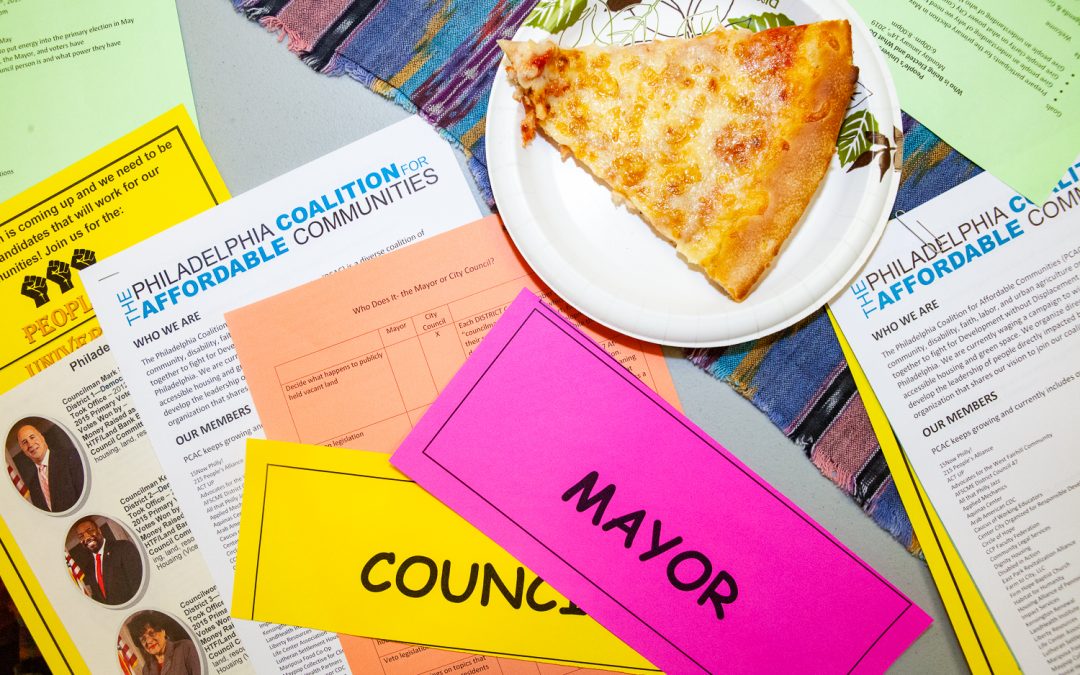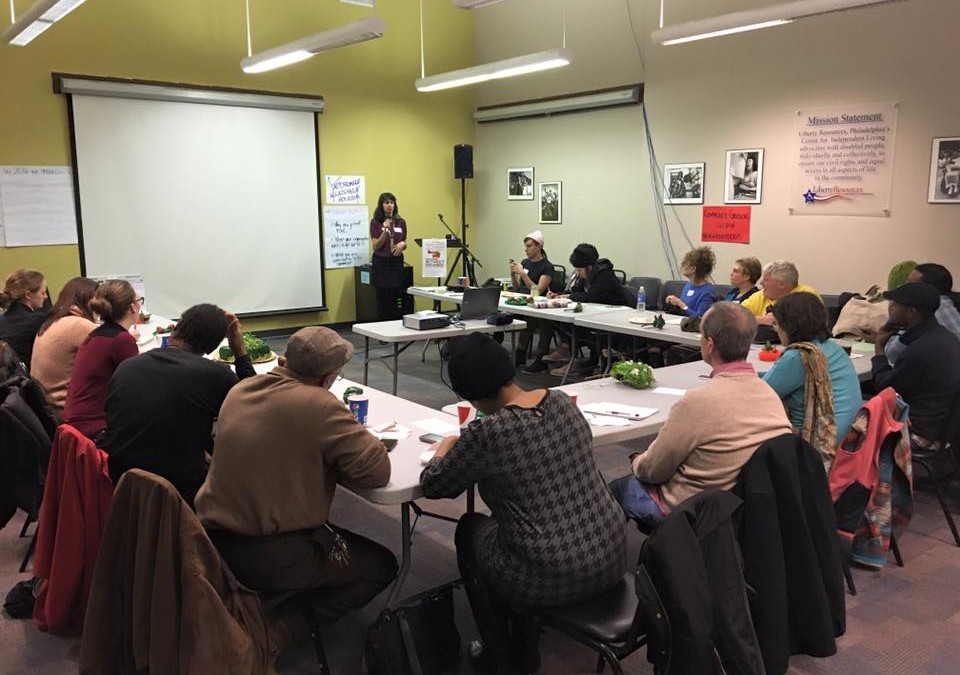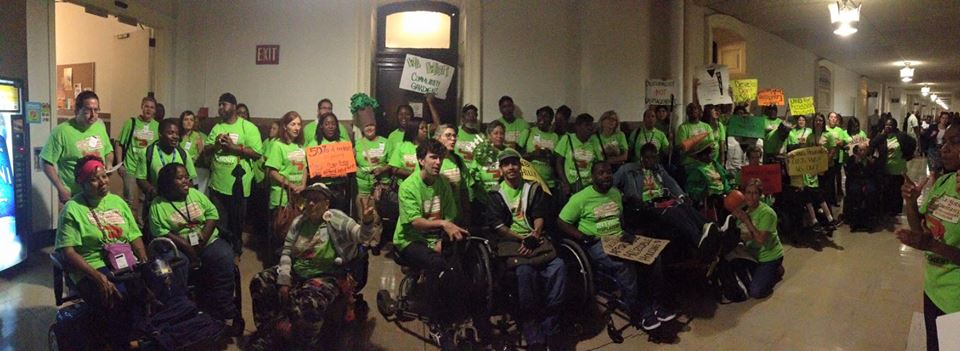by pcacadmin | Sep 30, 2019 | Accessible Housing, Affordable Housing, Philadelphia
Thursday, September 12th was the first day for city council after their recess. Like coming back to school after summer break, it’s a time to get back to work. For members of the Philadelphia Coalition for Affordable Communities, it is also a time to get back to work in a sense. We work all year round, but the first day of council is special. On that day we get back to making city council aware of our presence. This year we are demanding change to the ten year tax abatement. The tax abatement means tax free development on new construction, for ten years! In other words, developers don’t pay property taxes on all that fancy development you see happening in your neighborhood. Meanwhile, neighboring property taxes go up, affecting renters and homeowners. It also means that public schools lose revenue since schools are funded, in part, through property taxes. This incentive may have been a good thing when it started more than a decade ago to spur community revitalization, but it is now clear that developers no longer need this incentive. We need everyone to pay their fair share of taxes to fund things like affordable, accessible housing and public schools. This year, we met outside city hall at 10am and gathered with members of Our City Our Schools, an education reform coalition fighting for school funding. The coalition wore our signature green shirts with our message of development without displacement and Our City Our Schools came in their signature orange. Our objective was to present a united front to city council so they would know they can no...

by pcacadmin | Jan 29, 2019 | Accessible Housing, Affordable Housing, Displacement, Election, Gentrificaton, Philadelphia
My name is Emma; I was born here in Philadelphia and grew up mostly in the Wynnefield section of the city. I grew up on a block where everyone knew everyone. It was a working class neighborhood and the American dream was alive and well. I now live in South Philly and I work in North Philly at the Low Income Energy Assistance Program (LIHEAP). LIHEAP helps low income families with heating expenses and makes referrals to the city for individuals who need basic system repair assistance. I spend a lot of my free time wandering all over the city, this city that holds some of my dearest memories, the city that I love. The city has changed over the years, sometimes for the better and sometimes not so much. There are new houses coming up in old neighborhoods that changes how much it costs to live there. As a renter, I can tell you that it is almost impossible to find decent affordable housing. I have dealt with landlords who weren’t legal, who would not keep up repairs on the property, but whose prices were reasonable. Then when I would find a decent property, the rent would be almost double in price. There shouldn’t be such a disparity in pricing for decent housing in this city. Decent, affordable housing needs to be treated as a right and not a privilege. Working at LIHEAP I hear stories everyday about the hardships people are having with housing. Recently, I spoke to a client that is 97 years young who worked hard all of her life. She married, raised 3 children...

by pcacadmin | Feb 4, 2016 | Affordable Housing, News, Uncategorized
The State of our Coalition in 2015 The Philadelphia Coalition for Affordable Communities’ first membership meeting of the year, held on January 27, 2016, was filled to capacity. Together, we recounted highlights of our work in 2015, and began by celebrating the exciting growth of our Coalition in the past year, from 27 to 44 organizations! We recalled our powerful press conference last March with 150 supporters! There, we unveiled new research and a policy proposal to increase funding to the Housing Trust Fund through an anti-speculation tax on the practice of flipping houses. When City Council reconvened after its summer break, we rallied to urge Council to pass legislation without delay to increase affordable, accessible housing and green space. More than 85 Coalition supporters erupted in chants, demanding to know “Who will be our champion?” Before the meeting, we delivered petitions to Council’s Committee on Housing, Neighborhood Development and the Homeless, with signatures of 2,000 people in support of our demands. Throughout the year, Coalition members continued organizing in our communities and continuing our advocacy. At Housing Trust Fund meetings, we presented our proposal on how we can increase funding and, at Land Bank hearings, we testified on the need to establish specific targets for affordable accessible housing and green space. Housing For All in Washington, D.C. Wins $100 Million for Affordable Housing! Our guest speaker, Elizabeth Falcon, Director of Housing Advocacy at the Washington, D.C.’s Coalition for Nonprofit Housing and Economic Development (CNHED), gave a tremendous presentation on their inspiring Housing For All Campaign. The Campaign began in 2010 at a time of drastic cuts to the...

by pcacadmin | Sep 22, 2015 | Uncategorized
The Philadelphia Coalition for Affordable Housing packed city council chambers on September 10th in an action to remind City Council not to delay passing legislation that would increase affordable, accessible housing and green space. At the drop of council president Clarke’s gavel to start the fall session our sea of 85+ green shirts started chanting. Led by Connie Morrow of the Women’s Community Revitalization Project and Tony Brooks of Disabled in Action, we chanted: “What do we want? Affordable housing! When do we want it? Now! What do we want? Accessible housing! When do we want it? Now! What do we want? Community Gardens! When do we want it? Now! Who will be our champion? Who will be our champion? Who will be our champion?” For the next five minutes, our cries filled the council chambers, echoing demands of dignity and resources for our communities which are experiencing increased levels of market-rate development. These increasing housing costs are burdening our communities. Now is the time for council to take action. This session we expect city council to preserve affordability in Philadelphia by making more resources available for affordable accessible housing and community gardens. An anti-speculation tax on homes bought and sold within two years that provides money to the Housing Trust Fund would make sure real estate development benefits working-class residents. Before the meeting started we delivered over 2,000 petition signatures to the members of the Committee on Housing, Neighborhood Development and the Homeless. We also lined the halls with members holding signs and adorned in vegetables. Our strong turnout could not have been reached without the dedication of our coalition members: 15Now Philly!, Circle...

by pcacadmin | Aug 13, 2015 | Affordable Housing, Philadelphia
The Philadelphia Coalition for Affordable Communities c/o Women’s Community Revitalization Project 100 West Oxford Street, Suite E-2300 Philadelphia, PA 19122 August 12, 2015 His Holiness, Pope Francis Apostolic Palace 00120 Vatican City Your Holiness: We are honored that in a few short weeks you will be coming to visit Philadelphia. As you celebrate Mass on the steps of the Philadelphia Museum of Art and look at the hundreds of thousands of people on the Benjamin Franklin Parkway, you will see the gleaming skyscrapers and luxury apartment buildings that are testament to the promise of our great city, which has overcome decades of population decline to embark on a new era of growth and development. Yet mere blocks from where you will be standing are neighborhoods gripped by some of the most intense poverty in the United States. Philadelphia remains the poorest big city in America, and tens of thousands of Philadelphians are still living without access to affordable homes. More than 240,000 households citywide [including half of all renters] are spending more than they can afford on their housing costs. The new growth and luxury development in our city has created rising housing costs and put increased pressures on families – who now fear being priced out of the communities where they have lived for generations. In some neighborhoods of Philadelphia, real estate prices have increased 200 percent (200%) from 2000 to 2012. These rapid changes are having a disproportionate impact on minority communities. The African American population in sections of South and West Philadelphia, for example, has decreased by nearly 30 percent (30%) due to these pressures. Throughout...




